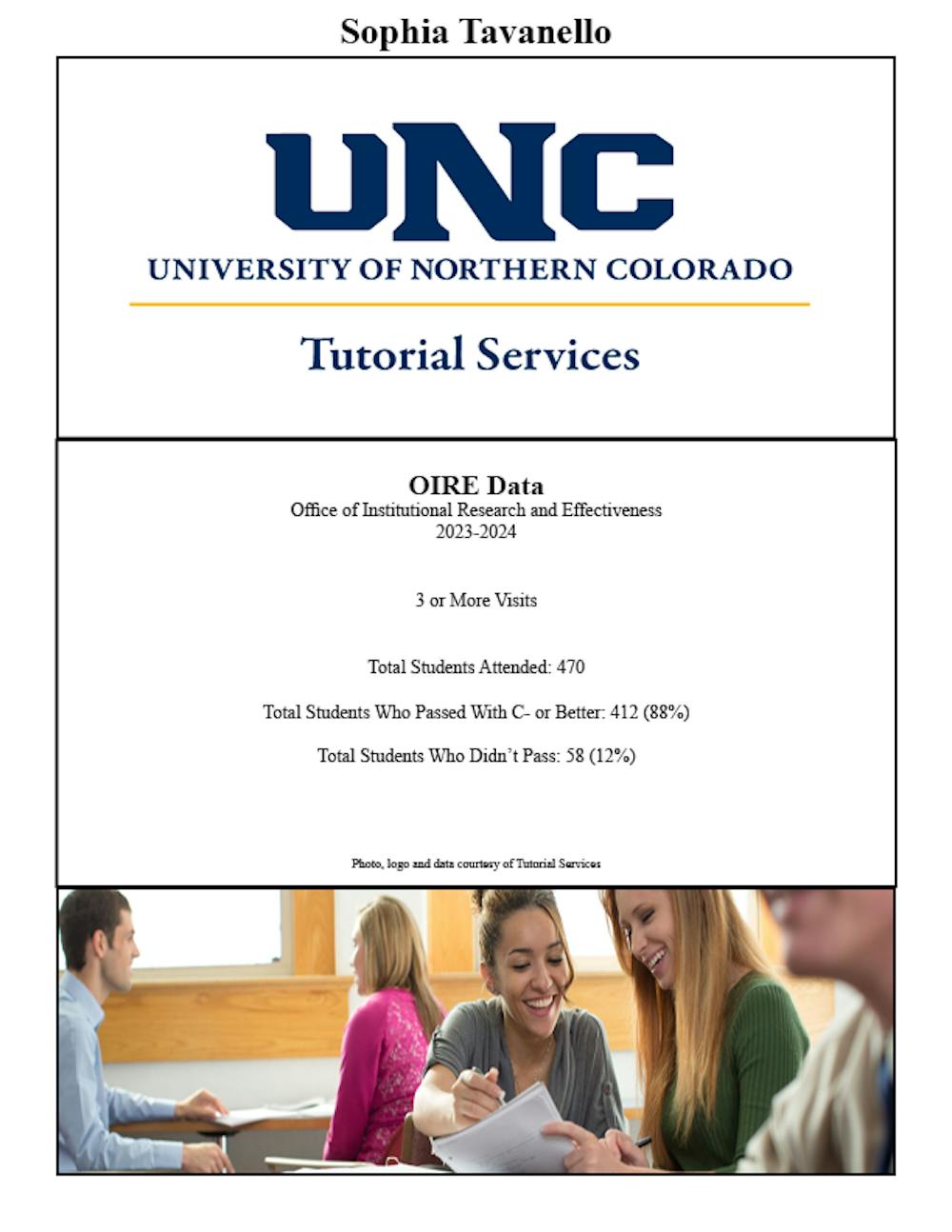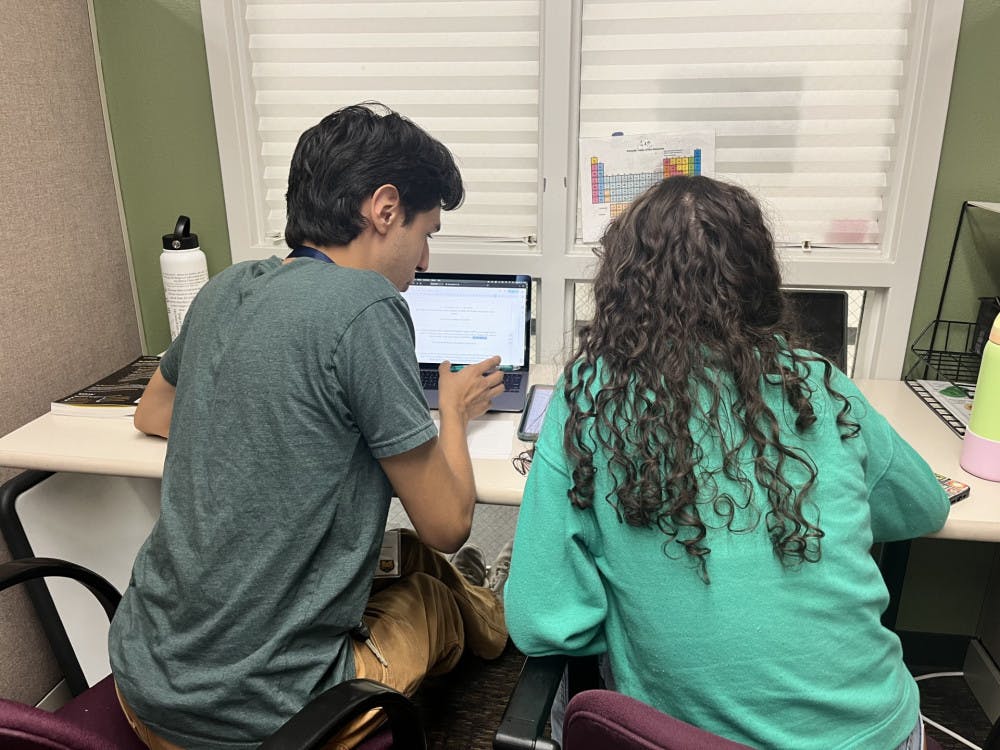Navigating college academics can often feel like walking on a tightrope, trying to find the
balance between passing your classes and keeping your grades up. But students at the University of Northern Colorado have access to a valuable resource designed to help them succeed.
Tutorial Services offers more than just a review of study material; it’s a comprehensive support system aimed at helping students thrive in even the most challenging courses.
“We are here to support students in their studies and give them tools to continue to use when they are not meeting with us,” said Melissa Hoffner, director of Tutorial Services. “We also strive to be a welcoming and caring environment. Seeking help can sometimes be hard, but we want it to be comfortable and helpful.”
“Tutoring allows people who are struggling in a course to be able to get the resources they need,” said Brecken Lusk, a senior peer tutor studying biology, psychology and philosophy. “The more often someone is able to interact with the material, the better it will go towards consolidating that memory.”
Located on west campus in Michener Library, the center provides assistance in a wide range of subjects, including mathematics, chemistry, writing, foreign languages and more. There are more than 100 courses available for in-person and online tutoring.
Whether through one-on-one tutoring, group study sessions or nighttime drop-in support, the center focuses on fostering a collaborative learning environment that helps students reach their full academic potential. Ashley Perez, a sophomore studying health sciences, has been a frequent tutee for general chemistry.
“I’ve absolutely noticed improvement,” she said, referring to her study habits. “I know I
wouldn’t be successful without the tutoring. I can’t just see something once and remember it, so I think going to tutoring and having someone teach me a different way, from a different perspective, helps me understand the material in another way.”
The center’s goal is to develop students’ skills as independent learners. It not only helps students get through difficult courses but also provides them with the tools and confidence to manage future academic challenges.
“This is our whole job,” said Caleb Sandoval, a fourth-year chemistry major and science tutor.
“The whole point is for us to help the tutees become their own independent learners and take charge of their own learning to the point where they end up not needing us anymore.”
One of the most notable aspects of the Tutoring Center is its accessibility. Not only is the resource free to use, but services are available both in-person and online, ensuring students can access help no matter where they are or how busy their schedules may be.
But what does a tutoring session look like?
Once the tutee has checked-in with the front desk staff and filled out a check-in form, the staff member will alert the tutor that their appointment is there. The tutor will come get the tutee, taking them back into the office, where they will sit one-on-one with the tutor for their allotted time. During the session, the tutor will help the student with study habits, new ways of understanding the material and sometimes just simple reviewing. After their time is up, the tutor will guide the student back to the front desk, where the student is given the option of making another appointment there in the office or on their own.
“Students can make appointments in person or online at the center,” Hoffner said. “They can also utilize our night drop-in hours and satellite drop-in locations.”
Tutors aren’t the only students who can help. SI Leaders, or Supplemental Instruction Leaders, are upper-level students who hold three 1-to-2-hour sessions each week to review course content and facilitate student-centered learning activities.
“Tutors are students who are interested in working with others and helping them in content that they did well in,” Hoffner said. “Tutors and SI Leaders are students who have received an A or B, have a 3.0 cumulative GPA and are recommended by the faculty. We have the tutors do classroom visits to hopefully help the students see who they may be working with.”
The tutors come from the same academic programs as the students they assist, offering a peer-based learning approach that resonates with many students.
“Having a peer tutor who has gone through these courses and has had the same professors can tell me their experience,” Perez said. “I can follow their same path because I know they were successful. They ask you how you do on the exams or ask how this study technique worked for you and offer alternatives.”
“It’s not intimidating at all,” Sandoval said. “I think for the most part the people who tutor have that mindset of actually wanting to help you out with your learning process and want to help you better understand these difficult concepts. If you don’t try it, you’ll never know if it’s worth it at all.”
Lusk, now a seasoned peer tutor, originally came in for tutoring for organic chemistry, where he received help that encouraged him to help others.
“So, after I had finished organic chemistry, I decided to tutor it,” Lusk said. “I had someone
come in to receive help with that course.”

The same student came back for tutoring every few weeks, at least twice before each exam, Lusk recounted. The sessions originally started off with helping the student understand what was going on in the class, eventually progressing to discussing study methods and applying knowledge to more complex topics.
“And then they just stopped coming altogether,” Lusk said. “And I had seen them around campus afterwards, so it’s not like they left. They just didn’t come back for tutoring, so I assumed that they ended up figuring out everything they needed to be able to pass that class on their own.”
Sandoval wants students to know that tutors are there for you when you’re struggling. He thrives on success stories, especially when he stops seeing his tutees because of their improvement. He explains how he ran into his tutee later on that year, learning that they were doing good enough in the class to the point where tutoring was no longer needed.
“I love when this happens,” Sandoval said. “It doesn’t happen as often as I would like but it’s
happened definitely, a handful of times. At the beginning of the semester, I could definitely see that they were very confused, and as the semester went on, I think they started to develop their own study habits for chemistry. I started seeing them less and less until I just never saw them again.”
As UNC students continue to balance academic, work and personal responsibilities, the Tutoring Center remains a key tool for success, ensuring that no student must face the challenges of college coursework alone.
“Don't be afraid to ask for help,” Perez said. “Something I learned is that I can bring what I
learned in tutoring to my friends in study groups and have a better understanding.”
For those feeling overwhelmed by coursework, the Tutoring Center is an essential resource.
Students reported that the center helped them pass a difficult class and improved their study
habits and academic performance.

“We have students that perform a letter grade better when utilizing the services,” Hoffner said. “Working with tutors allows students to connect with someone on campus and gives them tools that they can continue to use.”
In the 2023-2024 academic year, 470 students used the tutorial services. 412 students passed their classes with a C or higher, while 58 students didn’t pass.
The Tutoring Center also hosts two Study Nights per semester, each one right before midterms and finals. These nights are a four-hour study session, dedicated to helping students before exams. Many tutors for multiple subjects are available to help both individuals and groups. Although the first session has passed, the next Study Night is the Wednesday before finals week.
However, tutoring is not available during finals.
There are other tutoring centers available all over campus as well. Kepner, or Monfort, has
business tutors in the Financial Education Center, Candelaria holds geography and Japanese tutors and Skinner and Fraiser Hall hold music and theatre tutors. All centers, other than Michener, are available for drop-ins anytime during business hours.
The Tutoring Center is in L-149 on the lower level of Michener Library. The office is open for appointments only from 8 a.m. to 5 p.m., Monday through Thursday and Fridays from 8 a.m. to 4 p.m. Night tutoring, or drop-in hours, is available on the main floor of Michener, Monday through Thursday from 5 p.m. to 8 p.m. and Sunday from 6 p.m. to 8 p.m.
To sign up for tutoring, students must visit the website and click on the “Schedule an
Appointment” link. This will take them to a website called TutorTrac where students can search for available appointments and tutors for specific courses. Students will need to know their student ID number to make the appointment and provide their phone number to receive updates.
For more information on Tutorial Services, visit their website https://www.unco.edu/tutoring/ or call 970-351-1904.






